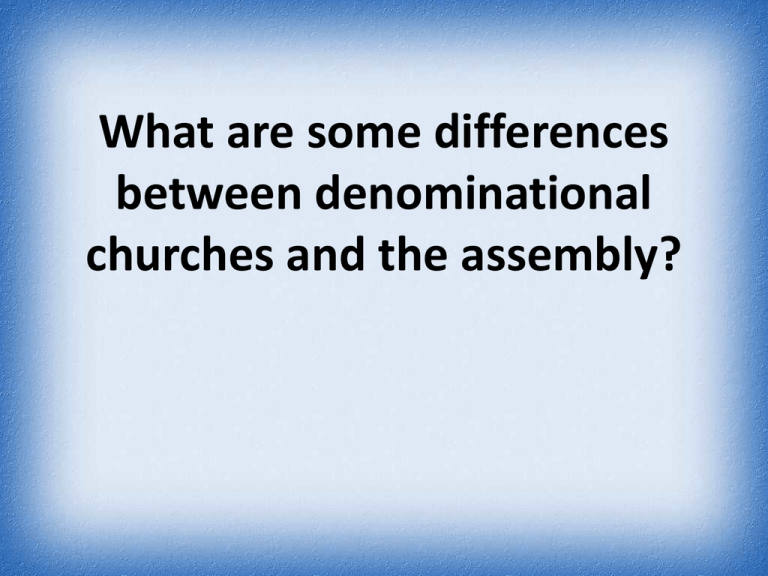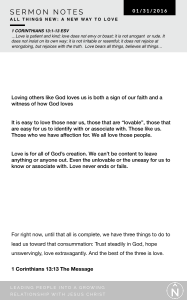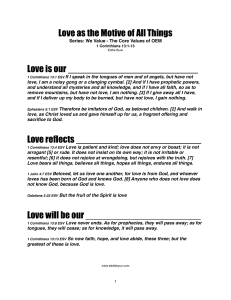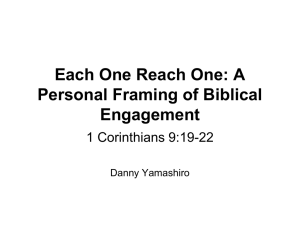Some difference between denominational churches and the assembly
advertisement

What are some differences between denominational churches and the assembly? It is easy to understand the attraction that a denominational church would have for any Christian. Often these churches have: •wonderful believers as members •attractive buildings •beautiful music •exciting youth groups (sometimes complete with gymnasium) •numerous outreach programs •dynamic pastors delivering interesting sermons God is faithful, by whom you were called into the fellowship of his Son, Jesus Christ our Lord. 1 Corinthians 1:9 (NKJV) Most denominational churches are marked by many of the following components: 1. A “church” is a company of Christians gathered under and distinguished by a denominational name (Ex. Baptist, Lutheran, Methodist, etc.). 2. The building in which they gather is usually called a “church”. 3. Such a church is held together by agreement to a set of Bible teachings, usually called a “Creed” or a “church constitution”. 4. Such a church usually requires membership in the church organization. 5. Such churches are presided over by a clergyman who: a) Is called “Reverend”, “Father”, “Pastor”, etc. b) Presides over the worship c) Administers the ordinances of the Lord’s Supper and Baptism d) Has sole rights in the pulpit e) Is paid a salary for his services 6. Such churches are supported financially by an unrestricted collection plate. Do any of these practices have scriptural support? A study of 1 Corinthians 1:9 will be very helpful in studying this topic. God is faithful, by whom you were called into the fellowship of his Son, Jesus Christ our Lord. (NKJV) God has called us to be in fellowship with Him. The word “fellowship” from the Anglo-Saxon and the word “communion” from the Latin, are both translations of the same Greek word (koinonia), meaning the same thing: “the holding of things in common” Act 2: 41-42 (ESV) 41. So those who received his word were baptized, and there were added that day about three thousand souls. 42. And they devoted themselves to the apostles’ teaching and the fellowship, to the breaking of bread and the prayers. 1. Denominational Names The Name of the Lord Jesus Christ is a Name above every other name (1 Corinthians 1:10-13, Philippians 2:10-11). Taking any second name detracts from the uniqueness of the Name of the Lord Jesus (1 Corinthians 5:4, Colossians 1:18b). Several other scriptures support this truth (Matthew 18:15-20, 1 Corinthians 1:1-2; 3:34, Philippians 2:9-11). 1 Corinthians 1:10-13 (ESV) 10. I appeal to you, brothers by the name of our Lord Jesus Christ, that all of you agree, and that there be no divisions among you, but that you be united in the same mind and the same judgment. 11. For it has been reported to me by Chloe’s people that there is quarreling among you, my brothers. 12. What I mean is that each one of you says, “I follow Paul,” or “I follow Apollos,” or “I follow Cephas,” or “I follow Christ.” 13. Is Christ divided? Was Paul crucified for you? Or were you baptized in the name of Paul? Philippians 2:10-11 (ESV) 10. so that at the name of Jesus every knee should bow, in heaven and on earth and under the earth, 11. and every tongue confess that Jesus Christ is Lord, to the glory of God the Father. Colossians 1:18b (ESV) 18. ...that in everything he might be preeminent. 2. The Name “Church” Nowhere in scripture is the meeting place of Christians referred to as a church. There are examples of several “churches” meeting in houses (Romans 16:4-5, Colossians 4:15). Church (ekkleesia) is made up of two words: “ek”, meaning “out of” and “klesis”, meaning “a calling”. Literally this means “a calling out of” or an “outcalling”. Romans 16:4-5 (ESV) 4. who risked their necks for my life, to whom not only I give thanks but all the churches of the Gentiles give thanks as well. 5. Greet also the church in their house. Greet my beloved Epaenetus, who was the first convert to Christ in Asia. Colossians 4:15 (ESV) 15. Give my greetings to the brothers at Laodicea, and to Nympha and the church in her house. 3. Creed or Constitution The Holy Scriptures are the final authority on all teachings (2 Timothy 3:16-17, Acts 20:32) not a man made creed or constitution. Assemblies are held together by the Spirit of God (1 Corinthians 3:16), acknowledgement of His Lordship (Philippians 2:9) and obedience to His Word (Revelation 3:8). 2 Timothy 3:16-17 (ESV) 16. All Scripture is breathed out by God and profitable for teaching, for reproof, for correction, and for training in righteousness, 17. that the man of God may be complete, equipped for every good work. Acts 20:32 (ESV) 32. And now I commend you to God and to the word of his grace, which is able to build you up and to give you the inheritance among all those who are sanctified. 1 Corinthians 3:16 (ESV) 16. (I did baptize also the household of Stephanas. Beyond that, I do not know whether I baptized anyone else.) Revelation 3:8 (ESV) 8. I know your works. Behold, I have set before you an open door, which no one is able to shut. I know that you have but little power, and yet you have kept my word and have not denied my name. 4. Church Membership There is no hint of teaching in the New Testament that requires a believer to “join” an assembly. The practices of making vows or joining a church membership are man made and not found in God’s Word. The Holy Spirit moved on the day of Pentecost and those that “gladly received his word were baptized: and the same day there were added unto them about three thousand souls.” (Acts 2:41) 5. Presided Over by a Clergyman a) “Reverend”, “Father”, etc. The word “reverend” appears once in the Bible (Psalms 111:9). It refers to God’s name and the word literally means “to fear, to show reverence”. In Philippians 1:1, Paul refers to saints, bishops and deacons (always plural). The word “pastors” appears once in the New Testament (Ephesians 4:11). The word is plural and it means “shepherd”. Elders or overseers are always mentioned in the plural (Acts 20:28). Philippians 1:1 (ESV) 1. Paul and Timothy, servants of Christ Jesus, To all the saints in Christ Jesus who are at Philippi, with the overseers and deacons: b), c) and d) Ministry of a “Reverend” or “Pastor” No one man has all the gifts needed for assembly ministry (1 Corinthians 12:7-11; 28-30, Ephesians 4:716). All gifts are needed in the assembly (1 Corinthians 12:21-25). 1 Corinthians 14:29-31 and Romans 12:1-8 show teaching that is contrary to sole rights to the pulpit. 1 Corinthians 12:7-11 (ESV) 7. To each is given the manifestation of the Spirit for the common good. 8. For to one is given through the Spirit the utterance of wisdom, and to another the utterance of knowledge according to the same Spirit, 9. to another faith by the same Spirit, to another gifts of healing by the one Spirit, 10. to another the working of miracles, to another prophecy, to another the ability to distinguish between spirits, to another various kinds of tongues, to another the interpretation of tongues. 11. All these are empowered by one and the same Spirit, who apportions to each one individually as he wills. 1 Corinthians 12:21-25 (ESV) 21. The eye cannot say to the hand, “I have no need of you,” nor again the head to the feet, “I have no need of you.” 22. On the contrary, the parts of the body that seem to be weaker are indispensable, 23. and on those parts of the body that we think less honorable we bestow the greater honor, and our unpresentable parts are treated with greater modesty, 24. which our more presentable parts do not require. But God has so composed the body, giving greater honor to the part that lacked it, 25. that there may be no division in the body, but that the members may have the same care for one another. e) Paid Pastors The Apostles received general instructions about their financial support from the Lord, Himself. Sometimes they worked with their hands to earn a living (Acts 18:1-3, 1 Corinthians 4:9-12) but they were never paid a salary for their labors (Luke 9:2-5; 10:3-8, 22:35, 1 Thessalonians 2:9, 2 Thessalonians 3:8, 1 Corinthians 9:14 with Philippians 4:14-19). Some have used 2 Corinthians 11:8 as justification for a paid pastor. If we believe that some assemblies paid literal “wages” to Paul we must also believed that he literally “robbed” them when he took their support. Luke 22:36 (ESV) 36. And he said to them, “When I sent you out with no moneybag or knapsack or sandals, did you lack anything?” They said, “Nothing.” 1 Thessalonians 2:9 (ESV) 9. For you remember, brothers, our labor and toil: we worked night and day, that we might not be a burden to any of you, while we proclaimed to you the gospel of God. 1 Corinthians 9:14 (ESV) 14. In the same way, the Lord commanded that those who proclaim the gospel should get their living by the gospel. 6. Unrestricted Collections 3 John:5-8 teaches that the disciples went forth “taking nothing from the Gentiles”, or the unsaved. 3 John 5-8 (ESV) 5. Beloved, it is a faithful thing you do in all your efforts for these brothers, strangers as they are, 6. who testified to your love before the church. You will do well to send them on their journey in a manner worthy of God. 7. For they have gone out for the sake of the name, accepting nothing from the Gentiles. 8. Therefore we ought to support people like these, that we may be fellow workers for the truth. “Occasional fellowship” “Fellowship” means “holding things in common” I Corinthians 1:9 (ESV) 9. God is faithful, by whom you were called into the fellowship of his Son, Jesus Christ our Lord.







